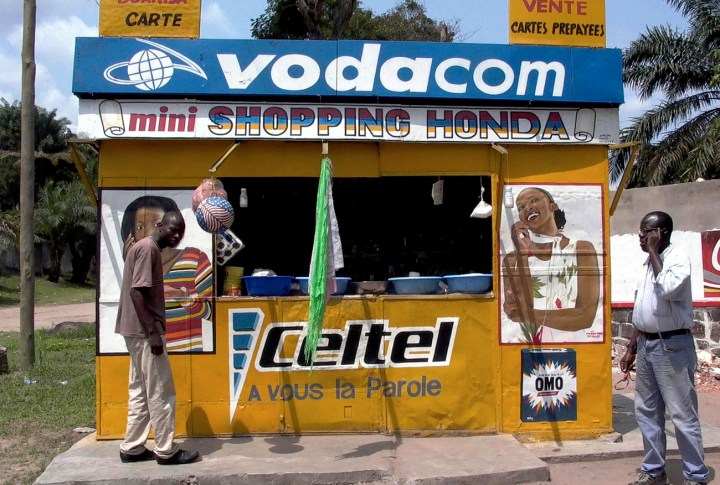Africa, Business Maverick
The Congo, the fixer and a client called Vodacom

When Vodacom’s business partnership in the Congo fell apart at the seams, and the company’s directors in the DRC were about to land in jail, the mobile giant’s chairman phoned Moto Mabanga, a fixer with firm ANC connections. Mabanga fixed the problem all right, but he and Vodacom had a difference of opinion on a little matter of a multi-million dollar success fee. No problem for Mabanga; he’s managed to get a Kinshasa commercial court to make a $21-million award against Vodacom. Now if only Vodacom would recognise the DRC’s jurisdiction. By MANDY DE WAAL.
Moto Mabanga is what you’d call a “fixer”. If you’re a company in Africa and have a big problem, there’s a chance he can make that difficulty go away or find resolution to a conflict. For this he’s paid a fair bit of money.
Vodacom, as anyone who follows the mobile industry knows, was having a problem in the Democratic Republic of the Congo. Well, you may ask, when hasn’t Vodacom been having a problem in the DRC?
This time, the problem, they’d been having it*, and so it was that Mabanga’s phone started ringing in the middle of the night. The man who was calling him was Advocate Oyama Mabandla, Vodacom’s chairman at the time.
(To refresh your memory on Vodacom’s ‘dictator’ ads, which no doubt endeared the mobile brand to the rest of the continent, check this one out…)
“Mabandla approached me late in the night because Vodacom was having a huge conflict with their partner in the DRC Congo,” says Mabanga on the phone to iMaverick from the Congo. Vodacom’s partner in the DRC was, and still is, Congolese Wireless Network (CWN).
“The chairman explained to me that Alan Knott-Craig (Vodacom’s former CEO) had offered to buy their local partner, which is a 49% shareholder of the business in the DRC. Vodacom has 51% of the business. Both parties agreed to the sale of CWN’s shares and Knott-Craig, in a letter from London, signalled that Vodacom would buy the shares for $500 a share,” says Mabanga.
The time came to pay and Mabanga explains that “for reasons known only to them, Vodacom reneged on the deal. Congolese Wireless Networks approached the courts in the Congo and the courts gave an order to arrest the Vodacom directors and liquidate Vodacom’s interest. The courts were in the process of forcing a liquidation of the company when I got the phone call.”
Mabanga, who is referred to as a “wheeler dealer” by local media, says he was asked by Oyama to intervene urgently on Vodacom’s behalf. “He told me to speak to the people in the Congo so that the Vodacom directors weren’t arrested. Vodacom’s reputation was on the line and Oyama said he wanted me to ensure that this wasn’t compromised.”
The fixer says Vodacom agreed to $1-million as a retainer and was told he would be paid a 5% success fee if he managed to make good on his promises. “The success fee meant that I would get 5% of the value of the 51% that was being put at risk by the actions of Vodacom’s partners who were trying to liquidate them.
“Mabandla warned me that if I was not successful stopping the arrests, then there wasn’t a need for me to speak to him or meet him again because Vodacom’s reputation would be soiled,” he says, adding that the very next morning he was successful in intervening and stopping the arrests.
Following his immediate success Mabanga advises that he was summonsed to Vodacom’s offices in Midrand where Vodacom’s executives were waiting. “It was like a funeral. They were still worried that something was going to happen in the DRC, but by midday they were more comfortable and they gave me all their files… everything to do with the conflict in the Congo.”
The fixer says Vodacom’s private jet was put at his disposal and soon he was flying back and forth from the DRC, and later went to Paris. “At that point the two parties (Vodacom and CWN) were not talking to one another, they were not agreeing, fighting and would not even sit in one room together,” says Mabanga who adds that after lengthy negotiations he got the parties together in the offices of Rothschild’s bank in Paris.
“We had boardrooms there, and I chaired the meetings in the boardroom. Those present included Rothschild, Vodacom, Vodafone, Telkom, Congolese Wireless Network and all the legal what have you. This went on for two days and the first day was very rough, because there was a lot of screaming and shouting. After the first day Pieter Uys, the current CEO of Vodacom, got on the plane and just disappeared.”
When Mabanga saved the day in Paris, Vodacom warmed to him and offered him more work, apparently going as far as enlisting him as a potential business partner in the Congo. In an earlier story, the Mail & Guardian says legal papers show Mabanga consulted to Vodacom in the DRC under a company named Namemco Energy, registered in Cyprus, for 6 May 2007 and 31 July 2007. The second period was said to be between 12 September 2007 and 31 August 2008.
Everything was going well when Mabanga was doing his thing in Africa and learned that Knott-Craig was due to resign. “My first agreement had three months on it, and the second agreement, they wanted to extend it because Vodacom wanted me to be their partner in the DRC. For the second agreement they gave me an extension and another $1.5-million,” he says.
“When I heard Alan Knott-Craig was resigning I tried to get in touch with him but he was no-where to be seen, and had left for Cape Town where he was going to get married. Pieter Uys became CEO and I tried to get in touch with him to get my success fee. Three times he made appointments and cancelled them,” Mabanga laments.
Now when it comes to matters of outstanding funds, there’s a three-year statute of limitations for making claims and Mabanga was watching time tick by. He states Vodacom just wasn’t paying him the success fee he alleges the mobile giant owed him.
“I also wrote to the chief executive of Vodafone in London, Vittorio Colao, trying to get him to ask Vodacom SA to come to the table so that we could resolve this, but that didn’t bring any joy. As a matter of fact he told me that he had spoken to Vodacom, and said he could just advise me to drop the matter,” Mabanga says.
The fixer says he was pressed into a corner and with the statute of limitations running out he was forced to go to the Johannesburg high court to lodge a claim against Vodacom. “A year later I found out that Vodacom was trying to sell their company in the DRC, and this got me worried.”
Mabanga approached the courts in the DRC, which took his case. “I brought the case against Vodacom in the DRC and provisionally attached 5% of Vodacom’s 51% shares in the DRC, which was meant to be valued at $40.8.”
As January drew to a close, Kinshasa’s criminal court ruled in Mabanga’s favour and awarded him $20-million with a further $1-million award for interest. The court also decided that Vodacom should pay Mabanga’s legal costs.
“I feel vindicated, although there is still a feeling that, after so many years, Vodacom was keeping me on a string and issuing statements that were damaging for my reputation,” says Mabanga. “Vodacom has been running a cowboy, kneejerk operation in the Congo, which is evident by the fact that they had to call me in the middle of the night to clean up this mess, and even after helping them and getting results; they still turn around and behave like that.”
“Richard Boorman (Vodacom’s spokesman) has released a statement that really leaves a sour taste in your mouth. He says that Vodacom would not accept a ruling from a DRC court. This is a company that has been operating a multi-million business in the Congo. They bought the business here for a very low price when they entered, and even with all the problems, the company has grown to a point where people are now talking about it being worth a billion,” says Mabanga. “The statement they made smacks of arrogance.”
When asked to comment on the issue, Boorman advised that he would not deviate from the corporate statement which had been sanctioned by the company’s lawyers. “We have not received the judgment on this matter so it is difficult to comment in detail. We would clearly have material objections to any judgment by a DRC court in which a monetary award was granted to Namemco while the contractual dispute is currently being heard in court in South Africa, which has jurisdiction on the issue,” the statement read.
In his article on the challenges of doing business in Africa in general, and Alan Knott-Craig’s “Heart of Darkness” moment in his biography in particular, in which he refers to the Congo issue, Tim Cohen details a difference of opinion in the matter of the success fee between Mabanga and Vodacom.
“Mabanga says the success fee was for generally maintaining the partnership, which he says was obviously done since it still exists four years later,” writes Cohen. “It appears there was a success fee mentioned in one of the contracts, but, it is claimed, this pertained to the possible sale of CWN shares, which never happened. Anyway it was subject to approval by the Vodacom board, and that never happened either. Mabanga claims it was agreed to, although he acknowledges that the agreement was only oral.”
A background check on Mabanga by the Mail & Guardian reveals that the “wheeler-dealer” is an ANC man who helped senior ruling party politicians with business transactions in Africa. It appears Mabanga helped Mvelaphanda Holdings gain oil concessions in Tanzania when Tokyo Sexwale was still at the helm, and that he helped fix Mandela’s 80th and 90th birthday parties, organising the Evander Holyfield vs. Lennox Lewis match when the boxing-loving statesman became an octogenarian. Mabanga is also said by the Mail & Guardian to be a business partner of a current member of staff in the presidency.
Then there’s another story at the Mail & Guardian about Moto Mabanga, but this one has nothing to do with business. Rather, it is about an eponymous Porsche Cayenne driver who got off lightly after being arrested by Ekurhuleni metro police who believed he was defeating the ends of justice for having an anti-speed trap device in his vehicle.
Curious and curiouser.
Last weeks award of $21 million to Mabanga in a Congo court and MTN’s eagerness to buy the troubled DRC operation might signal the end of a troubled African venture for Vodacom, but at what cost to the mobile giant’s reputation? Vodacom’s the king of road in SA, but in Africa it is another story. Vodacom has struggled on the continent and is only beginning to turn the corner and show shareholder returns. Its cocky swagger isn’t that out of place in the local market, but in the rest of Africa where SA’s arrogance is viewed with contempt, a US inspired, cowboy business style might not be the best way to ensure growth and good returns. DM
Read more:
- Vodacom Ordered to Pay ex-Congo Consultant $21 Million by Court on Bloomberg;
- TIM COHEN: African markets hold pitfalls for unwary SA firms in Business Day;
- Fixer guns for Vodacom in Mail & Guardian;
Photo: Reuters


















 Become an Insider
Become an Insider